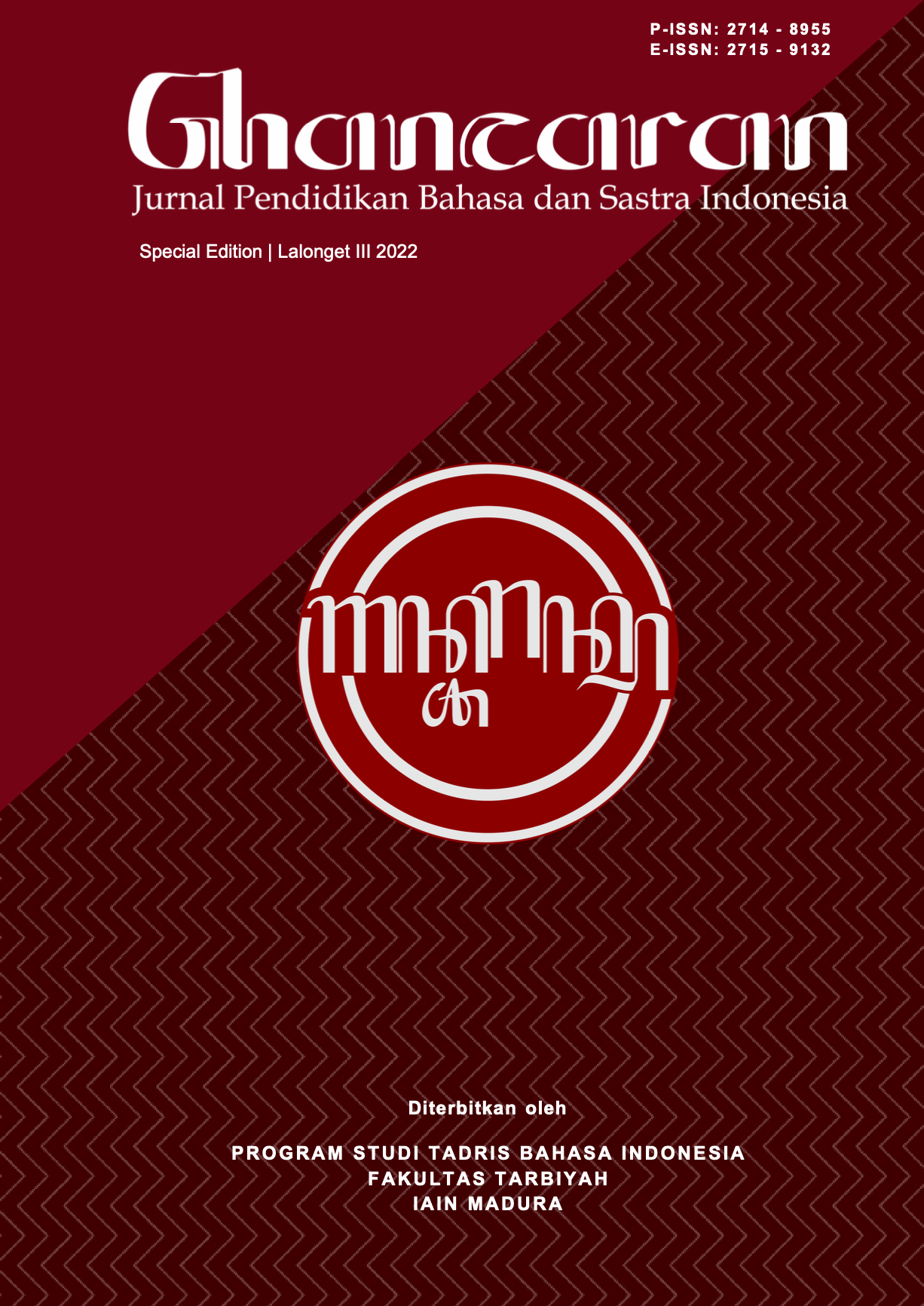Tinjauan Kurikulum Merdeka Belajar dengan Model Pendidikan Abad 21 dalam Menghadapi Era Society 5.0
 Abstract views: 2694
,
Abstract views: 2694
,
 PDF downloads: 2994
PDF downloads: 2994
Abstract
Society 5.0 is a is a society that can solve various cases using technological developments that were born from the industrial revolution 4.0. This period can be an opportunity and a challenge, especially in the world of education. Education must be able to answer challenges and at the same time must also improve in order to meet the needs of the community. The independent curriculum is one of the efforts to realize student-oriented education (student center), and the 21st century education model is present as a role model of ideal education in this modern era. This research is a library research with descriptive data description model. The focus of this research is the correlation between the independent learning curriculum and the 21st century learning model in facing the era of society 5.0. The correlation between the independent learning curriculum and the 21st century learning model cannot be separated. The position of the 21st century education concept as a general framework that becomes a reference for education, while the independent learning curriculum is a technical or method implemented to achieve this general framework. The independent curriculum and the 21st century education model were born as a form of response to the challenges posed by the industrial revolution era 4.0 and the era of society 5.0. The independent curriculum and the 21st century education model are interrelated and interrelated.
Downloads
References
Ghufron, M A. “REVOLUSI INDUSTRI 4.0: Tantangan, Peluang dan Solusi Bagi Dunia Pendidikan,” 2018, 6.
Giunta, Catherine. “An Emerging Awareness of Generation Z Students for Higher Education Professors.” Archives of Business Research 5, no. 4 (26 April 2017). https://doi.org/10.14738/abr.54.2962.
Hafid, dan Mahsun. “Konsep Merdeka Belajar Dan Pentingnya Kemampuan Memetakan Dunia Kerja.” AL-FIKRAH: Jurnal Studi Ilmu Pendidikan Dan Keislaman 3, no. 2 (30 Desember 2020): 108–24. https://doi.org/10.36835/al-fikrah.v3i2.68.
Hamriana, Hamriana, Sida Sida, dan Muhajir Muhajir. “Implementasi Pendidikan Karakter Dalam Kurikulum 2013.” Primary: Jurnal Pendidikan Guru Sekolah Dasar 10, no. 2 (18 April 2021): 465–72. https://doi.org/10.33578/jpfkip.v10i2.8095.
Indarta, Yose, Nizwardi Jalinus, Waskito Waskito, Agariadne Dwinggo Samala, Afif Rahman Riyanda, dan Novi Hendri Adi. “Relevansi Kurikulum Merdeka Belajar Dengan Model Pembelajaran Abad 21 dalam Perkembangan Era Society 5.0.” EDUKATIF : JURNAL ILMU PENDIDIKAN 4, no. 2 (28 Maret 2022): 3011–24. https://doi.org/10.31004/edukatif.v4i2.2589.
Kemendikbud. “Pembelajaran Abad 21,” t.t. cerdasberkarakter.kemendikbud.go.id.
———. “Pidato Mendikbud Nadiem Makariem pada Upacara Bendera.,” 28 November 2019.
Mardhiyah, Rifa Hanifa, Sekar Nurul Fajriyah Aldriani, Febyana Chitta, dan Muhamad Rizal Zulfikar. “Pentingnya Keterampilan Belajar Di Abad 21 Sebagai Tuntutan Dalam Pengembangan Sumber Daya Manusia.” Lectura : Jurnal Pendidikan 12, no. 1 (4 Februari 2021): 29–40. https://doi.org/10.31849/lectura.v12i1.5813.
Mirnawatiu, MIna. Gaya Kerja Milenial dan Tantangan Kolaborasi di Era Disrupsi Teknologi. Prosiding Seminar Nasional. Gorontalo: Ideal Publishing., 2019.
Muhajir, Rina Oktaviyanth, Ulfah Mey Lida, Nasikhin, Ahmad Muflihin, Muhamad Fatih Rusydi Syadzili, Hariadi, dkk. Implementasi dan Problematika Merdeka Belajar. Tulungagung: Akademia Pustaka, 2021.
Muhtadi, A., S. Teori, Pendekatan dan Aplikasi. Bandung: Simbiosa Rekatama Dakwah, 202M.
Nurkholis, Nurkholis. “Pendidikan dalam Upaya Memajukan TeknologI.” Jurnal Kependidikan 1, no. 1 (2013): 24–44. https://doi.org/10.24090/jk.v1i1.530.
Pendi, Yulius Obeta. “Merdeka Belajar yang Tercermin dalam Kompetensi Profesional Guru Bahasa Inggris SMP Negeri 01 Sedayu” 1, no. 1 (5 Mei 2020). https://jurnal.ustjogja.ac.id/index.php/semnas2020/article/view/7743.
Pujiriyanto. “Modul 2 Peran Guru dalam Pembelajaran Abad 21,” 1 November 2019. https://repository.bbg.ac.id/handle/repository.bbg.ac.id/handle/1101.
Saputra, H. Pengembangan Mutu Pendidikan Menuju Era Global: Penguatan Mutu Pembelajaran dengan Penerapan HOTS. Bandung: smile’s Publishing, 2016.
Septikasari, Resti, dan Rendy Nugraha Frasandy. “Keterampilan 4C Abad 21 dalam Pembelajaran Pendidikan Dasar.” Tarbiyah Al-Awlad: Jurnal Kependidikan Islam Tingkat Dasar 8, no. 2 (2018): 107–17. https://doi.org/10.15548/alawlad.v8i2.1597.
Sibagariang, Dahlia, Hotmaulina Sihotang, dan Erni Murniarti. “Peran Guru Penggerak dalam Pendidikan Merdeka Belajar di Indonesia.” Jurnal Dinamika Pendidikan 14, no. 2 (11 September 2021): 88–99. https://doi.org/10.51212/jdp.v14i2.53.
Sopiansyah, Deni, Siti Masruroh, Qiqi Yuliati Zaqiah, dan Mohamad Erihadiana. “Konsep Dan Implementasi Kurikulum MBKM (Merdeka Belajar Kampus Merdeka).” Reslaj : Religion Education Social Laa Roiba Journal 4, no. 1 (2022): 34–41. https://doi.org/10.47467/reslaj.v4i1.458.
Suraya, Izza, Mochamad Iqbal Nurmansyah, Emma Rachmawati, Badra Al Aufa, dan Ibrahim Isa Koire. “The Impact of Large-Scale Social Restrictions on the Incidence of COVID-19 : A Case Study of Four Provinces in Indonesia.” Kesmas: Jurnal Kesehatan Masyarakat Nasional (National Public Health Journal), no. 0 (27 Juli 2020). https://doi.org/10.21109/kesmas.v15i2.3990.
Suryaman, Maman. “Orientasi Pengembangan Kurikulum Merdeka Belajar.” Seminar Nasional Pendidikan Bahasa Dan Sastra, 21 Oktober 2020, 13–28.
Tarihoran, Emmeria. “Guru dalam Pengajaran Abad 21.” SAPA - Jurnal Kateketik Dan Pastoral 4, no. 1 (31 Mei 2019): 46–58. https://doi.org/10.53544/sapa.v4i1.68.
Warsono, Harianto. Pembelajaran Teori Aktif dan Asesmen. Bandung: Remaja Rosdakarya., 2012.
Yamin, Muhammad, dan Syahrir Syahrir. “Pembangunan Pendidikan Merdeka Belajar (Telaah Metode Pembelajaran).” Jurnal Ilmiah Mandala Education 6, no. 1 (30 April 2020). https://doi.org/10.36312/jime.v6i1.1121.
Copyright (c) 2022 GHANCARAN: Jurnal Pendidikan Bahasa dan Sastra Indonesia

This work is licensed under a Creative Commons Attribution-ShareAlike 4.0 International License.
Ghancaran: Jurnal Pendidikan Bahasa dan Sastra Indonesia uses an Open Access Policy under the Creative Commons Attribution-ShareAlike 4.0 International License. Authors publishing in this journal agree to the following terms:
- Ghancaran Journal holds the copyright and grants the journal rights for first publication with the work simultaneously licensed under a

The work is distributed under Creative Commons Attribution-ShareAlike 4.0 International License which allows others to share, copy, and redistribute the material in any media or format and adapt, remix, change, and develop the material even for commercial purposes, as long as it is stated credit and license derivative works under similar terms. - Authors may make additional contractual arrangements for non-exclusive distribution of the journal's published work version.
- Authors are permitted to post their work online (e.g., in institutional repositories or on their websites) before and during submission, as doing so may lead to productive exchange.



















